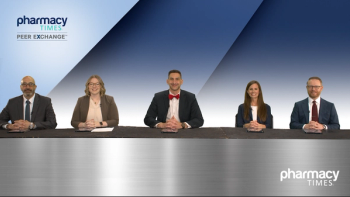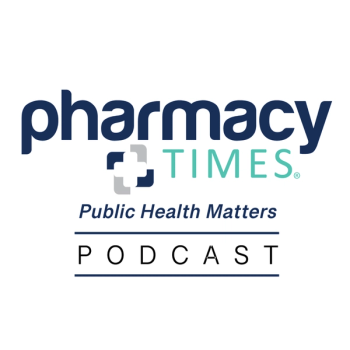
Vincent Young, MD, PhD, shares takeaways from Peggy Lillis Foundation's 2024 National C diff Advocacy Summit.

Vincent Young, MD, PhD, shares takeaways from Peggy Lillis Foundation's 2024 National C diff Advocacy Summit.

The CEO and co-founder of the Peggy Lillis Foundation discusses highlights from the organization's 2024 National C diff Advocacy Summit.

Shawn Riser Taylor, PharmD, CPP, CDCES, discusses the challenges and process of providing health care in a rural area of Guachipilincito in Honduras.

The use of artificial intelligence and real-time symptom monitoring integrate effectiveness of prescription digital therapeutics for mental health issues

Pharmacists play a key role in psychiatric medication overdose situations

Laura Gillespie, PharmD, discusses some of the financial benefits of having a pharmacist focused on antimicrobial stewardship efforts in a health system.

Exploring challenges and opportunities in developing personalized treatments for schizophrenia

Aimee Keegan, PharmD, BCOP, discusses key unmet needs that the NATALEE trial addresses for patients with HR+/HER2- early breast cancer.

Experts on the management of ASCVD discuss clinical practice patterns of high-risk patients and the common reasons for clinicians not intensifying cholesterol treatment.

Arun Jesudian, MD; Ralph J. Riello, PharmD, BCPS, and Chas McCormick, RPh, MBA, highlight the importance of adhering to evidence-based guidelines and utilizing approved medications in the management of hepatic encephalopathy, emphasizing their crucial role in preventing patient relapse within 30 days of hospital discharge.

A panel of clinical pharmacists introduce themselves and discuss how LDL cholesterol target achievement compares with guideline goals for patients with ASCVD who are treated with maximally tolerated statin monotherapy.

Panelists explore the critical roles of lactulose and rifaximin in managing hepatic encephalopathy, a potentially severe condition that can lead to intensive care unit (ICU) admission.

Laura Gillespie, PharmD, discusses the impact of pharmacist-led initiatives on health care–associated C diff rates for health care systems.

Regardless of how this fits into workflow, pharmacists can play a significant role in counseling patients on nutrition and holistic health.

Adrijana Kekic, PharmD, a pharmacogenomics clinical specialist with Mayo Clinic in Phoenix, Arizona, discussed current guidelines for pharmacogenomics.

Pharmacists can play important roles in counseling patients and, in some states, prescribing contraception.

A clinical pharmacist details how treatment algorithms differ between early-stage and metastatic breast cancer.

Expert perspectives on differentiating between the three CDK4/6 inhibitors available for the treatment of metastatic breast cancer are discussed, highlighting factors that inform treatment selection.

Medical experts examine the current treatment landscape and goals for patients with hepatic encephalopathy, addressing patient outcomes and hospital discharge planning, while also acknowledging that some patients may require rehabilitation or long-term care facilities to sustain remission and optimize their recovery.

Arun Jesudian, MD; Ralph J. Riello, PharmD, BCPS, and Chas McCormick, RPh, MBA, delve into the complexities of hepatic encephalopathy, exploring the various risk factors that contribute to its development, such as alcohol-induced cirrhosis, sarcopenia, CNS medications, opioids, and other potential triggers.

Sa’ed Al-Olimat, PharmD, co-founder of the Psychedelic Pharmacists Association, discussed the future of psychedelic medicines and the unique ethical challenges they present.

Danielle Roman, PharmD, BCOP, discusses the efficacy and safety outcomes of CDK4/6 inhibitors in early-stage breast cancer, as well as key considerations for CDK4/6 inhibitors in this indication.

Kirollos Hanna, PharmD, BCPS, BCOP, FACCC, addresses some common challenges pharmacists may be facing when looking to operationalize bispecifics at their facilities.

Kirollos Hanna, PharmD, BCPS, BCOP, FACCC, discusses the role of the pharmacist in relation to bispecific care team readiness and patient readiness.

Jonathan Levitt, Esq, discusses legislation and legal action taken to rein in pharmacy benefit managers’ DIR fees.

Scott Soefje, PharmD, BCOP, FCCP, FHOPA, MBA, addresses some of the key steps pharmacists should take when conducting a financial analysis for cancer drugs.

Whitney Lewis, PharmD, BCOP, discusses how the treatment armamentarium for NSCLC has expanded in recent years and the associated cause for this acceleration.

Kirollos Hanna, PharmD, BCPS, BCOP, FACCC, addresses some of the considerations for bispecifics in relation to facility readiness at different sites and among different stakeholders.

James Shehan shares insights on the promising trends shaping the weight loss medication and how changing views of obesity could pave the way for uptake GLP-1s.

Tune into this episode of “Public Health Matters” to learn about Dr. Pauline K. Long and her entrepreneurship journey, as well as how she creates meaningful impacts on patients in marginalized communities and within public health.